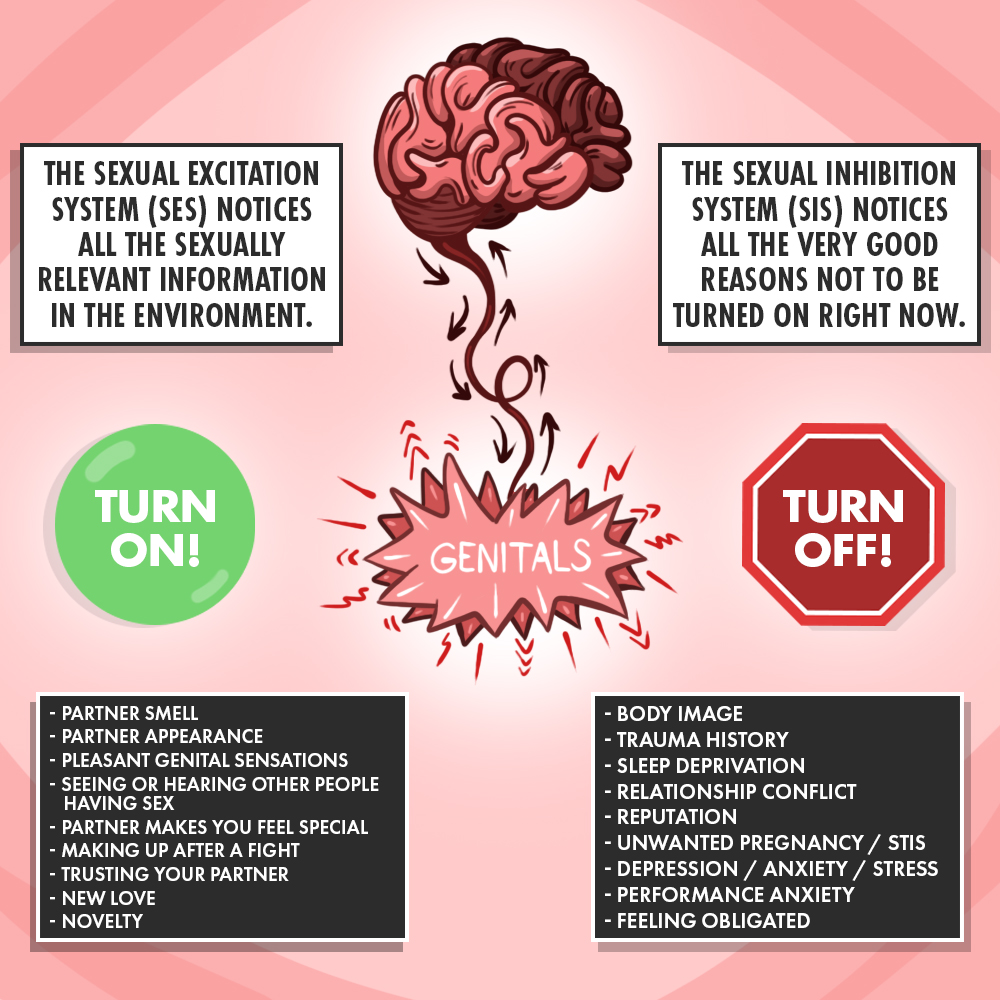Stop Worrying During Sex
The activity in my brain at any given time is a frenetic maelstrom of hot garbage that’s impossible to turn off.
If you’ve ever caught a glimpse of that crazed, twitchy look in my eye, while I’m simultaneously checking in on work emails and cooking dinner and responding to my 6-year-old’s endless requests, you know this to be true.
But when it comes time to get down and dirty in the bedroom, things in my head kick into overdrive.
What did I accomplish today? What’s due this week? What do I need to prioritize tomorrow? When should I do the laundry? Are these sheets dirty? Did we lock the door? Does my belly look especially enormous from this angle? Is he still even attracted to me? How can he possibly still be attracted to me!? I look like I have a kangaroo pouch. I’m exhausted. How can I make this go more quickly without insulting him? If I hold my breath and angle my pelvis this way, might I possibly reach orgasm? Maybe celibacy is the answer.
In her book Come As You Are, sexuality educator Emily Nagoski writes about the dual control model, a model of the sexual response cycle that takes into account the interaction between the sexual excitatory and sexual inhibitory processes in our brains and bodies—or, as she refers to them, the accelerators and the brakes. The things that make us want sex and the things that dampen our desire. We’ve already talked about the sexual response cycle with a different model, developed by Masters and Johnson, that you can read about here.

Accelerators can include sources of sexual stimulation like lingerie and sex toys and erotic films. But no matter how many high-end clit vibes your partner throws at you, you’re not going to be fully present for a sexual encounter unless you’ve also taken care of the things that are simultaneously telling you to pump the brakes.
The brakes themselves are common enough. We allow ourselves to become distracted by the to-do lists in our heads. To be waylaid by stress or exhaustion.
And then there are all the tiny anxieties we carry around the sex act itself.
So, what can we do about those brakes? The first step is to acknowledge that, usually, all those things you’re worried about are just not worth the brain space.
Those Pesky To-Do Lists. Recent search shows that Americans experience more stress today than people their age did in the 1990s. This seems like no-duh information. After all, we’re in the midst of a pandemic. The economy is in free fall. Many more people are reckoning with the systemic racism at the heart of our culture. Thanks to technological advances, the bad news and the constant demands on our time come in an unending onslaught. Stress and exhaustion are inevitable. Hell, simply typing out this paragraph made me stressed out and exhausted.
Reminding yourself to worry only about those things you can actually control is easier said than done. There are still steps you can take to minimize the impact this stress has upon you. In addition to some good old talk therapy, wellness practices such as acupuncture, exercise, a nutritious diet, and yoga have been shown to reduce anxiety and depression.
When you take care of yourself, you are better equipped to take care of your everything else.
Body Image Issues. I was recently watching an old episode of The Mindy Project, in which Dr. Mindy Lahiri explains to her colleagues that she uses a series of illusions in order to ensure that her sexual partners never actually see her naked. Ha! When it comes to sex, our bodies are inescapable. Their curves. Their smells. Their secretions. That hairy patch on our knee where we did a really bad job of shaving earlier that day.
Many of us are self-conscious about our bodies, especially during sex, but we shouldn’t be. First off, research shows that when we allow ourselves to be distracted by body image issues during sex, our sexual satisfaction decreases, which is just a bummer.
Second of all, it’s important we remind ourselves that we’re our own toughest critics. One recent study shows that we’re usually wrong about what those of the opposite sex find most attractive. No matter what sexual orientation you are, however, and no matter who you’re having sex with, you should know that the person propositioning you wouldn’t be there if they didn’t want to be. If they didn’t find you incredibly sexy. If they didn’t want to rip off your clothes and ravish you.
So, sure, turn off the lights if it makes you feel more comfortable, but leave those mental contortions at the door and be secure in the knowledge of just how damn hot you are.
Performance Anxiety. Some worry they won’t be able to get it up. Others worry they won’t be able to keep it up. Others are preoccupied by the almighty orgasm. And of course, many worry they’re just not doing it right. They’re not wild enough. Loud enough. Skilled enough. Acrobatic enough.
Everybody. CHILL THE EFF OUT. (And by “everybody,” I mean me. Almost all of these people are me.)
Our restrictive, goal-oriented approach to sex magnifies our performance anxiety, and it’s to our detriment. If our brains are crowded with all these groundless fears, we leave ourselves no room to experience pleasure.
So, first of all, let me remind you that “sex” is not just penis-in-vagina penetrative intercourse, nor does orgasm have to be the end goal. If there’s an aspect of your sexual encounter that’s freaking you out, consider removing it from the equation, at least for now. Do you have trouble achieving or maintaining an erection? Find another way to be sexually intimate. Are you worried that your partner hasn’t reached orgasm? If it happens, it happens—but it doesn’t have to. If you remove your primary stressor, you’ll be able to instead focus on giving and receiving pleasure. Which is what it’s all about, right?
Plus, you must stop comparing yourself to others. That last erotic film you saw? That sexual thriller on TV? The trailer for 365 Days? None of it is real (thank god).
I can promise you that your partner is happy just to be intimate with you, whatever form that takes.
Kink Self-Consciousness. Finally, another common bedroom fear is what our partner(s) will think of our turn-ons. Will they think we’re a perv and run screaming for the door? Will they think we’re too vanilla and, I don’t know, get bored and wander off?
This is where I’m going to talk communication—and, honestly, good communication is key when it comes to all the items on this list. I once wrote an entire article about sexual communication, because I consider it to be the most important ingredient for a healthy and mutually pleasurable sex life. And the research bears this out. According to research, greater amounts of sexual communication are associated with increased orgasm frequency in women and greater relationship and sexual satisfaction in both men and women. Which makes perfect sense. After all, our partners can’t read our minds.
I’m not going to tell you that your partner will be game to try everything on your sexual wish list. That may not be true, depending upon their comfort levels.
But you could be missing out on the sexy-sex of your dreams if you don’t even tell your partner what you enjoy, what feels amazing, and why.
And they could be missing out, too!
If you’re afraid to bring up your turn-ons, consider using a yes/no/maybe list to kick off this conversation, presenting it as a tool to spice things up in the bedroom and to swap tips on the best ways to give each other pleasure.
You’ll be so glad you opened up to each other and it will be a relief to have one less anxiety-bug buzzing around your head.









